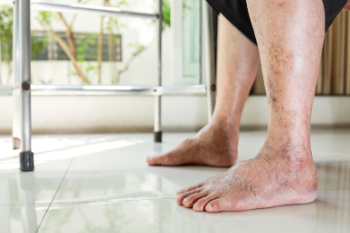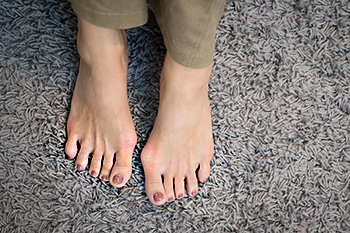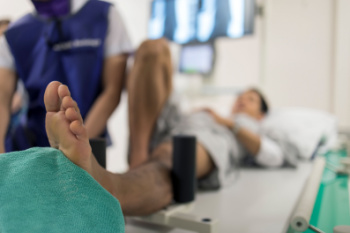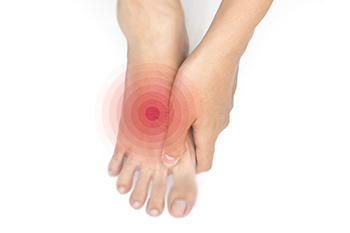Items filtered by date: November 2024
Systemic Sclerosis and Foot Health

Systemic sclerosis, or scleroderma, is a rare autoimmune disease that causes skin and connective tissues to harden and tighten, often impacting the feet. This condition affects blood vessels and internal organs as well, leading to complications in various body areas. When systemic sclerosis targets the feet, it can lead to thickened skin, limited mobility, and poor circulation, increasing the risk of ulcers and infections. Although it primarily affects women, typically between the ages of 30 and 50, anyone can develop systemic sclerosis. Risk factors include genetic predisposition, environmental exposures, and certain infections. Foot care for those with systemic sclerosis includes moisturizing, wearing proper footwear, and regular foot inspections. If you have this condition, it is strongly suggested that you visit a podiatrist for tailored care. This type of specialist can help with custom orthotics, ulcer prevention, and circulation support, improving foot comfort and preventing complications related to this challenging condition.
When dealing with systemic disease of the feet, it is extremely important to check the affected areas routinely so that any additional problems are caught quickly. If you have any concerns about your feet and ankles contact Mark Poplawski, DPM from Jersey Shore Podiatry, LLC. Our doctor will assist you with all of your podiatric needs.
Systemic Diseases of the Feet
Systemic diseases affect the whole body, and symptoms usually are displayed in the feet. This condition can make a patient’s ability to walk unbearable. Systemic diseases include gout, diabetes mellitus, neurological disorders, and arthritis.
Gout – is caused by an excess of uric acid in the body. Common symptoms include pain, inflammation, and redness at the metatarsal/phalangeal joint of the base big toe. Gout can be treated by NSAIDs to relieve pain and inflammation, and other drugs that lower the acid levels in the body.
Diabetes mellitus – is an increase in the level of blood sugar that the body cannot counteract with its own insulin. Failure to produce enough insulin is a factor in Diabetes.
Diabetes of the Feet
Diabetic Neuropathy – may lead to damaged nerves and affect the feet through numbness and loss of sensation.
Peripheral Vascular Disease – can restrict the blood flow to the feet, and often times lead to amputation of the feet.
If you have any questions please feel free to contact our office located in Toms River, NJ . We offer the newest diagnostic and treatment technologies for all your foot and ankle needs.
Bunion Exercises and When to Consult a Podiatrist

Bunions are bony bumps that form on the joint at the base of the big toe, often causing pain, swelling, and stiffness. While bunions are primarily structural issues, targeted exercises can help manage discomfort, improve flexibility, and slow progression. Toe stretches, big-toe circles, and towel scrunches are effective for maintaining joint mobility. Resistance exercises with a band around the big toe can also strengthen the surrounding muscles, helping stabilize the foot. However, if pain from a bunion persists or limits your daily activities, it is suggested that you visit a podiatrist for a comprehensive treatment plan, which may include custom orthotics, footwear advice, and in severe cases, surgical options.
If you are suffering from bunion pain, contact Mark Poplawski, DPM of Jersey Shore Podiatry, LLC. Our doctor can provide the care you need to keep you pain-free and on your feet.
What Is a Bunion?
Bunions are painful bony bumps that usually develop on the inside of the foot at the joint of the big toe. As the deformity increases over time, it may become painful to walk and wear shoes. Women are more likely to exacerbate existing bunions since they often wear tight, narrow shoes that shift their toes together. Bunion pain can be relieved by wearing wider shoes with enough room for the toes.
Causes
- Genetics – some people inherit feet that are more prone to bunion development
- Inflammatory Conditions - rheumatoid arthritis and polio may cause bunion development
Symptoms
- Redness and inflammation
- Pain and tenderness
- Callus or corns on the bump
- Restricted motion in the big toe
In order to diagnose your bunion, your podiatrist may ask about your medical history, symptoms, and general health. Your doctor might also order an x-ray to take a closer look at your feet. Nonsurgical treatment options include orthotics, padding, icing, changes in footwear, and medication. If nonsurgical treatments don’t alleviate your bunion pain, surgery may be necessary.
If you have any questions, please feel free to contact our office located in Toms River, NJ . We offer the newest diagnostic and treatment technologies for all your foot care needs.
It's Time for Beautiful Feet
What Is a Foot Stress Fracture?

Stress fractures are tiny cracks in the bones of the foot, often caused by repetitive pressure or overuse. They are sometimes referred to as hairline fractures. Commonly seen in athletes, these fractures can occur due to sudden increases in activity, wearing improper footwear, or training on hard surfaces. They are particularly prevalent in sports that involve running or jumping. Symptoms typically include localized pain that worsens with activity, swelling, and tenderness when pressure is applied to the affected area. In some cases, bruising may also be visible. A podiatrist plays a critical role in diagnosing and treating stress fractures. They may perform a physical examination and imaging tests, such as X-rays or MRI scans to confirm the injury. Treatment often includes rest and elevation, along with recommendations for appropriate footwear and activity modifications. If you suspect a stress fracture, it is suggested that you schedule an appointment with a podiatrist for accurate diagnosis and effective management.
Activities where too much pressure is put on the feet can cause stress fractures. To learn more, contact Mark Poplawski, DPM from Jersey Shore Podiatry, LLC. Our doctor can provide the care you need to keep your pain free and on your feet.
Dealing with Stress Fractures of the Foot and Ankle
Stress fractures occur in the foot and ankle when muscles in these areas weaken from too much or too little use. The feet and ankles then lose support when walking or running from the impact of the ground. Since there is no protection, the bones receive the full impact of each step. Stress on the feet can cause cracks to form in the bones, thus creating stress fractures.
What Are Stress Fractures?
Stress fractures occur frequently in individuals whose daily activities cause great impact on the feet and ankles. Stress factors are most common among:
- Runners
- People affected with Osteoporosis
- Tennis or basketball players
- Gymnasts
- High impact workouts
Symptoms
Pain from the fractures occur in the area of the fractures and can be constant or intermittent. It will often cause sharp or dull pain with swelling and tenderness. Engaging in any kind of activity which involves high impact will aggravate pain.
If you have any questions please feel free to contact our office located in Toms River, NJ . We offer the newest diagnostic and treatment technologies for all your foot and ankle needs.
Diabetes and the Danger of Peripheral Neuropathy

Diabetes significantly affects the feet, often leading to serious complications if not managed properly. High blood sugar levels can damage blood vessels and nerves, reducing circulation and sensation in the feet. This condition, known as diabetic neuropathy, means that injuries like cuts, blisters, or sores may go unnoticed, increasing the risk of infection. Poor circulation in diabetic individuals also delays wound healing, making it more difficult for minor injuries to recover. Over time, untreated wounds can turn into ulcers, which, if infected, may lead to severe consequences, including gangrene or even amputation. Foot deformities, such as bunions and hammertoes, are more common in people with diabetes due to weakened muscles and tendons. Regular foot care, including daily inspections, proper footwear, and regular check-ups with a podiatrist, is essential to avoid complications and maintain foot health in diabetics. For this reason, it is suggested that if you have diabetes, you make an appointment with a podiatrist for routine care.
Neuropathy
Neuropathy can be a potentially serious condition, especially if it is left undiagnosed. If you have any concerns that you may be experiencing nerve loss in your feet, consult with Mark Poplawski, DPM from Jersey Shore Podiatry, LLC. Our doctor will assess your condition and provide you with quality foot and ankle treatment for neuropathy.
What Is Neuropathy?
Neuropathy is a condition that leads to damage to the nerves in the body. Peripheral neuropathy, or neuropathy that affects your peripheral nervous system, usually occurs in the feet. Neuropathy can be triggered by a number of different causes. Such causes include diabetes, infections, cancers, disorders, and toxic substances.
Symptoms of Neuropathy Include:
- Numbness
- Sensation loss
- Prickling and tingling sensations
- Throbbing, freezing, burning pains
- Muscle weakness
Those with diabetes are at serious risk due to being unable to feel an ulcer on their feet. Diabetics usually also suffer from poor blood circulation. This can lead to the wound not healing, infections occurring, and the limb may have to be amputated.
Treatment
To treat neuropathy in the foot, podiatrists will first diagnose the cause of the neuropathy. Figuring out the underlying cause of the neuropathy will allow the podiatrist to prescribe the best treatment, whether it be caused by diabetes, toxic substance exposure, infection, etc. If the nerve has not died, then it’s possible that sensation may be able to return to the foot.
Pain medication may be issued for pain. Electrical nerve stimulation can be used to stimulate nerves. If the neuropathy is caused from pressure on the nerves, then surgery may be necessary.
If you have any questions, please feel free to contact our office located in Toms River, NJ . We offer the newest diagnostic and treatment technologies for all your foot care needs.





